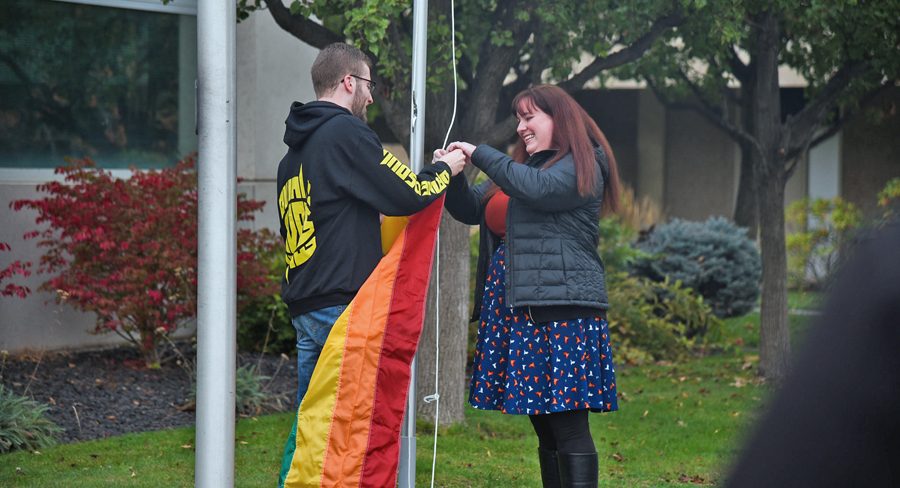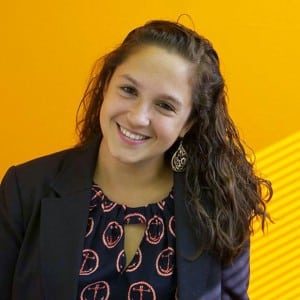
Home » Tri-City leaders offer tips to foster workplace LGBTQIA+ inclusivity
Tri-City leaders offer tips to foster workplace LGBTQIA+ inclusivity
PFLAG’s Benton-Franklin chapter offers several training sessions every month for employers

February 15, 2019
Janie Romine remembers the time she was counseled by administrators against openly talking about her gay son with her colleagues.
It taught her a valuable lesson: the workplace is not inclusive and supportive by default.
“That was a glaring example of discrimination of just me as a straight woman that loves her children and holds an affirming view,” she said. “When I next interviewed, I knew I didn’t want to go forward again if I couldn’t openly support the queer community.”
Now she wears her rainbow lanyard proudly at a local Hilton hotel, which she said is a LGBTQIA+-friendly employer.
LGBTQIA+ is an umbrella term to describe anyone who identifies as lesbian, gay, bisexual, asexual, transgender, intersex, non-binary, genderfluid, genderqueer and even questioning.
Romine is a parent, first and foremost, but she’s also a vocal advocate for equipping local employers with the communication tools and skills they need to create a safe and inclusive workplace for LGBTQIA+ employees, their families and the community.
As the president of Benton and Franklin chapter of PFLAG (which stands for Parents and Friends of Lesbian and Gays), she volunteers her time holding panel discussions, workshops and role-playing activities on workplace inclusivity. The group holds about three or four training sessions a month.
“We are mental health professionals, registered clinicians and leaders sharing our journey,” Romine said. “I’m the proud mom of two gay children.”
She said she encourages employers to be upfront about their policies on inclusion during the hiring process so co-workers know what is and isn’t allowed and to promote a safe space for the queer community with respectful, allied co-workers.
“It’s just a conversation you have to have upfront, and you need the courage to have that conversation. Their workplace is going to be much stronger,” Romine said.
“Nobody should have to live their life in fear of losing their employment,” she added.
The Washington state Law Against Discrimination sets forth strict protections against discrimination based on gender expression, actual or perceived gender identity, and sexual orientation.
This includes discrimination in places such as restaurants, hotels and public schools, housing, employments, and credit and insurance transactions.
Currently no statutory federal laws protect LGBTIA+ individuals against sexual orientation or gender identity discrimination in the workplace. Some examples that the U.S. Equal Employment Opportunity Commission views as unlawful sex discrimination include failing to hire an applicant because of their given or chosen gender, firing an employee for gender transition, denying an employee equal access to restrooms, denying employee promotion because of sexual orientation, or failing to use preferred pronouns.
Katie Banks, a professor of political science, communication and leadership at WSU Tri-Cities, said she encourages local employers to express their pronouns in support.
Last year, Banks gave a talk on “The ABCs of LGBTQIA+ in the Workplace” at the Tri-Cities Diversity Summit, organized by the Tri-City Regional Chamber of Commerce, in October. She also serves as an organizer for the WSU Tri-Cities’ annual Social Justice Institute and chairs the WSU President’s Commission for Gender Identity/Expression and Sexual Orientation.
“If you want to show you’re an ally business and that you’re inclusive, ask people what pronouns they prefer to use and state your preferred pronouns yourself,” Banks said. “Most people don’t come out during the interview process.”
In fact, she said 40 percent of LBTQIA+ employees aren’t comfortable being “out” in the workplace. Of those who do come out, 35 percent face discrimination, she said.
Romine said she regularly emphasizes the important of pronouns and the importance of using the person’s chosen name in communications.
“It’s a wounding thing for someone who is transgendered to be misgendered,” Romine said.
During her recent Diversity Summit talk, Banks discussed the importance of inclusion in the workplace. She said that according to research there is a 25 percent increase in individual productivity and a 35 percent increase in team productivity in an inclusive workplace.
“You’re better at retaining minority employees and recruiting diverse talent which has been shown to lead to innovation, better understanding of problems and ability to tackle the solution,” Banks said.
Banks said gender identity is fluid and the language surrounding it is iterative — workplace training from 10 years ago may be badly outdated today.
“There is new language in this field, like ‘enby,’ which is short for non-binary, and is language that is only two or three years old,” Banks said.
Non-binary refers to people who don’t neatly fit into the categories of “man” or “woman,” as they may have a gender that blends elements of both, a gender that is different than either male or female, or they don’t identify with any gender, according to the National Center for Transgender Equality.
To position a business as a partner and ally to the LGBTQIA+ community, both to future employees and customers, Banks said even small tokens of solidarity matter — like putting LGBTQIA+ friendly stickers on a door or shop window.
For a LGBTQIA+-friendly workplace, “have inclusive and family-oriented staff events that include different versions of partners or spouses,” Banks said.
Jay Chavez, manager at Out and About — the only gay club in the Tri-Cities — and coordinator of Tri-Cities Pride, said local businesses like Free Culture Clothing, HAPO Community Credit Union, Numerica Credit Union, Adventures Underground, Castle Megastore, Tumbleweird, Brother’s Cheesesteaks and Chikibaby Boutique have been supportive of the local LGBTQIA+ community.
Banks said having written non-discrimination and inclusion policies is important.
“It is useful to have your company statement or strategic plan a company’s goals on diversity, inclusion and cultural competency,” Banks said.
Both Banks and PFLAG are available for workplace onsite training on LGBTQIA+ inclusion. For more information on PFLAG, search for PFLAG Benton Franklin on Facebook. The group also holds monthly support events the second Tuesday of every month at Fuse in the Richland Parkway.
Local News Diversity
KEYWORDS february 2019





